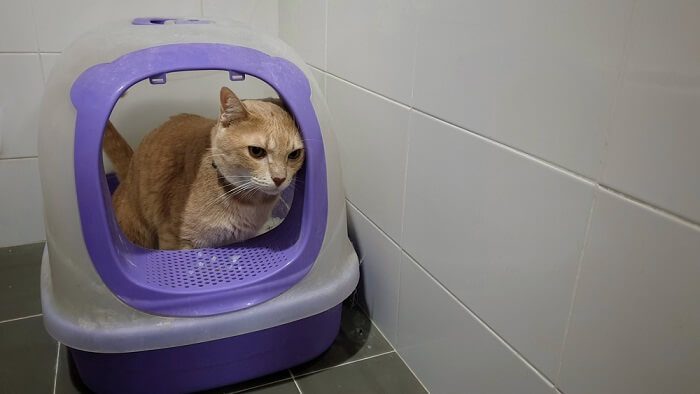
This article aims to provide a simple, clear explanation about gastroenteritis for cat owners whose pets may be affected, and who want to understand more about what’s happening.
What Is Gastroenteritis?
Gastroenteritis is defined as inflammation of the digestive tract, also known as the gastrointestinal tract. The name is derived from the Latin words for stomach (gastro), intestines (entero) and inflammation (-itis), so when you put these together, gastroenteritis means “inflammation of the stomach and intestines.”
Inflammation describes the way that the body reacts when challenged with any sort of insult or irritation. It is the main way that the immune system defends the body. There are many possible causes of inflammation, including infections, irritation, and allergies.
Inflammation results in swelling, heat, redness, pain, and lack of function. So in gastroenteritis, all of these issues affect the stomach and intestines.
What Causes Gastroenteritis?
Gastroenteritis can be caused by anything that results in inflammation of the stomach and intestines. Common causes include:
- Food allergies
- Ingestion of any irritant substance (e.g., dietary indiscretion)
- Reaction to medication (e.g., anti-inflammatory drugs)
- Viral infections (e.g., feline parvovirus/feline infectious enteritis)
- Bacterial infections
- Intestinal parasites (e.g., roundworms)
- Physical irritants, such as hairballs or foreign objects
- Other diseases (e.g., tumors)
How Common Is Gastroenteritis?
Gastroenteritis is a common cause of vomiting and diarrhea in pet cats.
Symptoms of Gastroenteritis in Cats

Cats may experience gastroenteritis if they eat things that upset their stomach, like grass.
With gastritis (inflammation of the stomach), the main sign is vomiting. With enteritis (inflammation of the intestinal tract) the main sign is diarrhea.
With gastroenteritis, both vomiting and diarrhea are commonly seen, as well as the following:
- Dullness
- Abdominal pain
- Inappetence or anorexia
- Weight loss over a period of time
Diagnosis of Gastroenteritis in Cats
If your veterinarian suspects that your cat may have gastroenteritis, the following steps may be taken.
1. Detailed History Taking
Your vet will discuss every aspect of your cat’s condition and overall health care, looking for clues about why your pet is unwell, and in particular finding out about anything that might affect the digestive system.
This will include asking about your cat’s vaccination status, dietary history (including any supplements given), parasite control program, contact with other cats, and toileting habits.
2. Physical Examination
Your veterinarian will check your cat over carefully, checking for the signs of gastroenteritis. This will include an inspection of the mouth and teeth, careful palpation (feeling) of the abdomen, listening to the chest and abdomen with the stethoscope, and an inspection of the anal area. Occasionally, the nature of the trace of feces on the thermometer may be inspected after the temperature has been taken.
3. Routine Blood Tests and Urinalysis
It’s very likely that your veterinarian may carry out blood work, including the usual panel of diagnostic tests, such as hematology (complete blood count with assessment of blood cells) and biochemistry profiles.
In gastroenteritis, typically there may not be many abnormalities, although electrolyte imbalances may be identified. Importantly, other causes of the same signs of illness will be ruled out (such as liver disease, kidney disease, pancreatitis, etc.) because the blood parameters reflecting these areas of the body will usually be normal indicating that your cat’s health is generally good.
Blood tests are also useful to assess your cat’s level of hydration, which is important as dehydration is common in cases of vomiting and diarrhea.
The thyroid hormone level may be assessed, as hyperthyroidism can cause signs of vomiting and diarrhea that mimic gastroenteritis.
Urinalysis will be carried out as with many other sick cats, as part of a general investigation.
4. Specialized Blood Tests
Your veterinarian may recommend specific blood tests for some viral infections such as feline leukemia virus (FeLV) and feline immunodeficiency virus (FIV), since these can be linked to the underlying cause of gastroenteritis and there are significant implications if your cat is positive for either of these.
5. Other Tests
Blood pressure measurement may be carried out to assess your cat’s general health. Radiographs (x-rays) may be taken of the abdomen to check for other causes of the signs shown by your cat (including screening for foreign bodies). Ultrasound can be a useful way of further assessing the structure of abdominal organs.
Endoscopy may be carried out to view the internal structure of the mucosal lining of your cat’s stomach and intestines. In some cases of gastritis, this can be used to diagnose the presence of gastric ulcers.
In complex or long standing cases, a biopsy may be taken of the stomach or intestines, either by endoscopy or a full laparotomy (surgery). A biopsy is the only definitive way to confirm a diagnosis of inflammatory bowel disease (IBD).
Your veterinarian will advise you on which detailed investigations are needed.
Treatment of Gastroenteritis in Cats
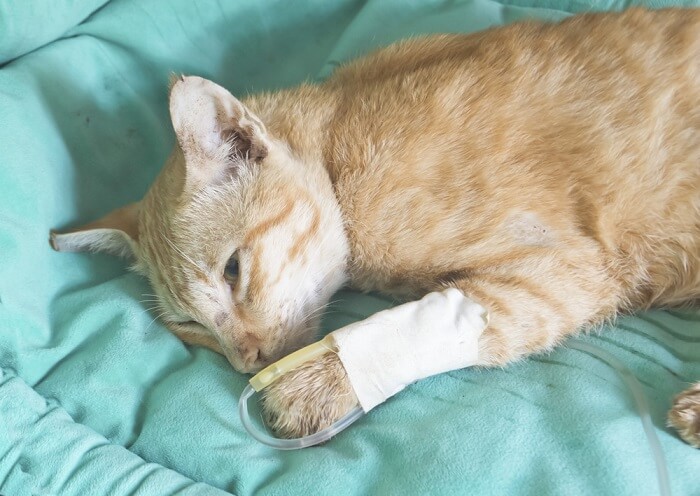
If your cat is very dehydrated due to vomiting and diarrhea, your vet may give IV fluids.
In general, the aim is first to stabilize a cat affected by gastroenteritis, and then to identify and treat the underlying cause.
- Antiemetics may be given to control vomiting
- Probiotics may be given to cats with diarrhea
- A bland, highly digestible diet may be recommended
- In severe cases, stabilization may include intravenous fluid therapy to rehydrate and support the patient
Specific treatment may then be given for the underlying cause, if this can be identified. Some causes may have already been removed and the patient simply needs to be stabalised (e.g. ingestion of irritant substances).
Further treatment may include:
- Food allergies may require a special diet (e.g. hydrolysed) to reduce the risk of further allergic reaction, as well as anti-inflammatory medication
- Bacterial infections may respond to probiotics, or rarely may require antibiotics
- Viral infections cannot be directly cured, but the animal can be supported while their own immune system tackles the virus
- Parasitic infections require specific anti-parasite medication
- Physical irritants, such as hairballs or foreign objects, may need to be surgically removed
- Other disease, such as tumors, may require surgical intervention
Monitoring and Prognosis
The prognosis for most cases of gastroenteritis is very good. Your veterinarian will advise you on what follow up care is needed, but in general, monitoring your pet for further signs of vomiting or diarrhea is the main way to confirm that a full recovery is underway.
Conclusion
Gastroenteritis is a common cause of vomiting and diarrhea in cats. In simple cases, a simple treatment may suffice, but if the problem continues, veterinary intervention is important.
Frequently Asked Questions
How long does gastroenteritis last in a cat?
A simple bout of gastroenteritis (caused by something like dietary indiscretion) should only last 24 to 48 hours. If the signs of gastroenteritis go on for longer than this, it's important to discuss a detailed diagnosis of the underlying cause with your veterinarian.
How do you treat gastroenteritis in cats?
A simple case of gastroenteritis can be treated by a short fast (12 hours) followed by offering a bland, highly digestible food for 24 to 48 hours. If a cat continues to show signs of gastroenteritis, veterinary intervention is essential to identify the underlying cause.
What are symptoms of gastritis in cats?
The main sign of gastritis is vomiting, while in enteritis, diarrhea is seen, and in gastroenteritis, vomiting and diarrhea is noticed. Dullness, abdominal pain, inappetence or anorexia, and weight loss over a period of time may be seen with all three conditions.
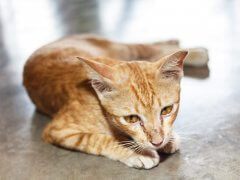

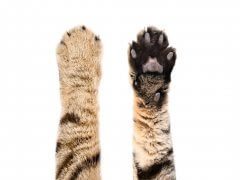


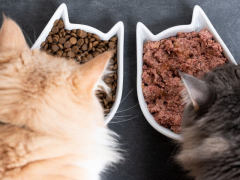
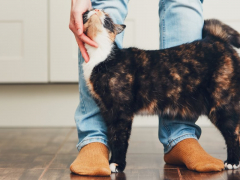

What kind of food do you recommend for cats with Gastroenteritis (Can you recommend a brand)?
Hi Fatima, we have an article on the best cat food for diarrhea here—it should cover everything you need!